SINGAPORE: It had been months since my aunt Amy Chia decided that she would try to find her long-lost relatives in China but her research was going slowly.
The 49-year-old Singaporean was in the midst of doing a master’s degree in creative writing part-time and was working on a screenplay that was loosely based on her family in Singapore as well as her relatives in China.
But it had been decades since anyone, including her father or members of her extended family, had visited the hometown of her grandparents.
All she knew was from the stories her grandparents had told her: That they had come from a village called ‘Lau Kai’ in the city of Shantou.
But she could not find this anywhere on Google Maps.
She was also armed with the name of her granduncle’s son – “Chia Chun Nan” – but this did not yield any clues.
It was not the first time Amy had toyed with the idea of searching for her relatives but as she had been busy with work and had no clue where to start, her plans never materialised.
“It was only in these recent couple of years that I decided to really try and search, because I was going to work on my script and that sort of became a vehicle for me to solidify all the plans,” she said.
When I heard of my aunt’s quest, I initially thought her chances of success would be slim, bearing in mind the limited information she had. Being so far removed from that particular branch of family in China and having never met them before, it seemed to me that my aunt was searching for something she had no way of knowing existed.
But her tenacity and resourcefulness soon quelled my doubts and I found myself eager to see where it would take her.
With the help of her father and her cousin, Amy slowly pieced together a patchwork of clues, drawn from stories that had been passed down through generations and from their own hazy memories, to figure out where to begin her search.
“I approached people who might have clues, for example, my cousin’s friend whose ancestors came from the same village as well as my fifth aunt, who was the one who helped my grandparents write letters back to the village in the past.
“But nobody had an address or any way of connecting with the village … Everybody had lost contact already,” she said.
However, a major breakthrough came when she realised that the name of the village ‘Lau Kai’ could be translated as ‘Liu Xi Cun’ in Chinese.
“My father initially told me that the village was called ‘Liu Xi Xiang’ which roughly translates as Stream Village in Chinese, but I tried searching it everywhere on the internet and couldn’t find anything. It was as if it didn’t exist,” said Amy.
“It was only later when it suddenly hit me that there are a few words for village in Chinese, one of which is ‘Cun’ so I when I keyed in ‘Liu Xi Cun’ and I finally got a hit.
“It was an ‘aha!’ moment, and it became so real,” she said. “What I had been hearing from word of mouth (became) a very tangible, visual picture.
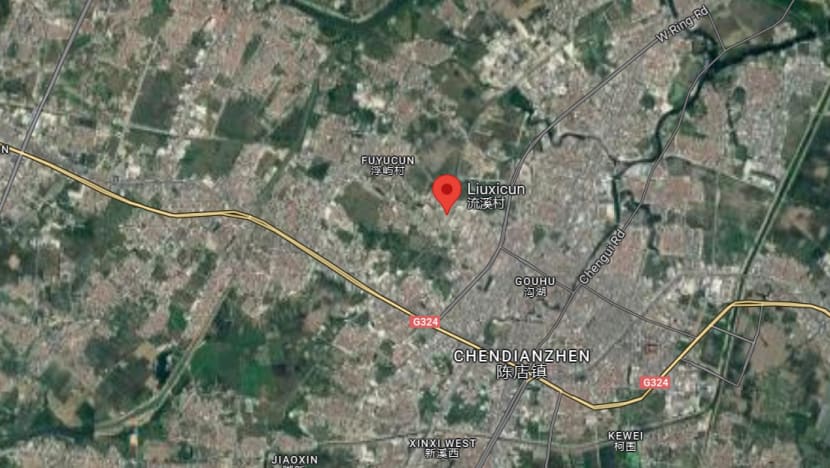
“I started to get more curious and I wanted to find out more so I started searching online as well as Instagram and Chinese video networks for any information related to the place.”
“There was very little data and information about Liu Xi village and in fact, I was still unsure whether it was even the correct village,” she said.
“But according to the map, the village was next to this township called Chendian so then I asked whether Chendian sounded familiar to my dad. He said yes and told me that it was actually where my grandmother had come from, so my grandparents were actually living side by side.
“So from there, I was actually able to pinpoint the area that we would have to go and search.”
Given that Shantou covers an area nearly three times the size of Singapore, this narrowed her search significantly.
For the first time since she started her research, Amy felt a bubble of excitement growing in her belly; from nothing, she now had two leads.
GROWING INTEREST IN TRACING ROOTS
When I heard that Amy, who is my mother’s cousin, was searching for our long-lost relatives in Shantou, I was curious if more people were doing the same.
Singapore-registered genealogy company My China Roots, which provides ancestry research and investigation services, said its website gets an average of over 12,000 online visitors from Singapore each month, an increase from the 10,000 visitors per month it recorded a year ago.
The company provides customised services such as sending researchers on behalf of clients to track down ancestry records and relatives in China. They also help with planning trips to China for clients who wish to visit their ancestral homes.
According to the company’s founder and chief executive officer Lie Huihan, the bulk of Singaporean clients who engage their services are between 35 and 60 years old.
Sharing the common reasons why these clients engage their services, Mr Lie said: “Because they still have aging parents or young kids, they want to do something with their parents that is emotionally valuable to them.
”For those with younger kids, they are wondering what kind of cultural values to transfer to their kids so that’s more often the driver for the middle-aged group.”
He added: “For the senior group, it’s more often to do with what kind of legacy they are leaving behind and what they want their grandchildren to know when they are not there anymore.
“Very often, there’s a moral element of wanting to honour and celebrate ancestors.”
Similarly, Facebook group Chinese Ancestry Research, which was set up to help members discover more about their heritage as well as provide advice on how to find their ancestral village or relatives, has also seen a surge in interest.
It now has over 17,000 members, with Singaporeans making up about 10 per cent, according to the founder Nathan Co.
His Facebook page is filled with posts from members seeking information about their ancestry or asking for tips on how to find their long-lost relatives.
“We didn’t used to get so many requests so I do feel the increasing trend and not everybody is posting on the group, some are messaging me privately and I’m helping them (to find out more about their ancestry or families),” said Mr Co.
As for my aunt, she wanted to see where her family came from.
Her grandfather had been the second of three brothers. The eldest had also left and settled in Thailand, leaving the youngest son to stay behind in Shantou to take care of their elderly parents.
“When my grandparents were still alive, they would always talk about their hometown and I even knew of their visits back to the village and how they would bring things back for their family,” she said.
“My grandma was always very close to the family back in China.
“When I was much younger, I was a bit indifferent to my grandparents’ stories about their family in Shantou. I would listen to them and remember them but it never really meant too much to me.
“But now, I wanted to go – not just because of my research – but also because of my father so that he could actually get to see his extended family.”
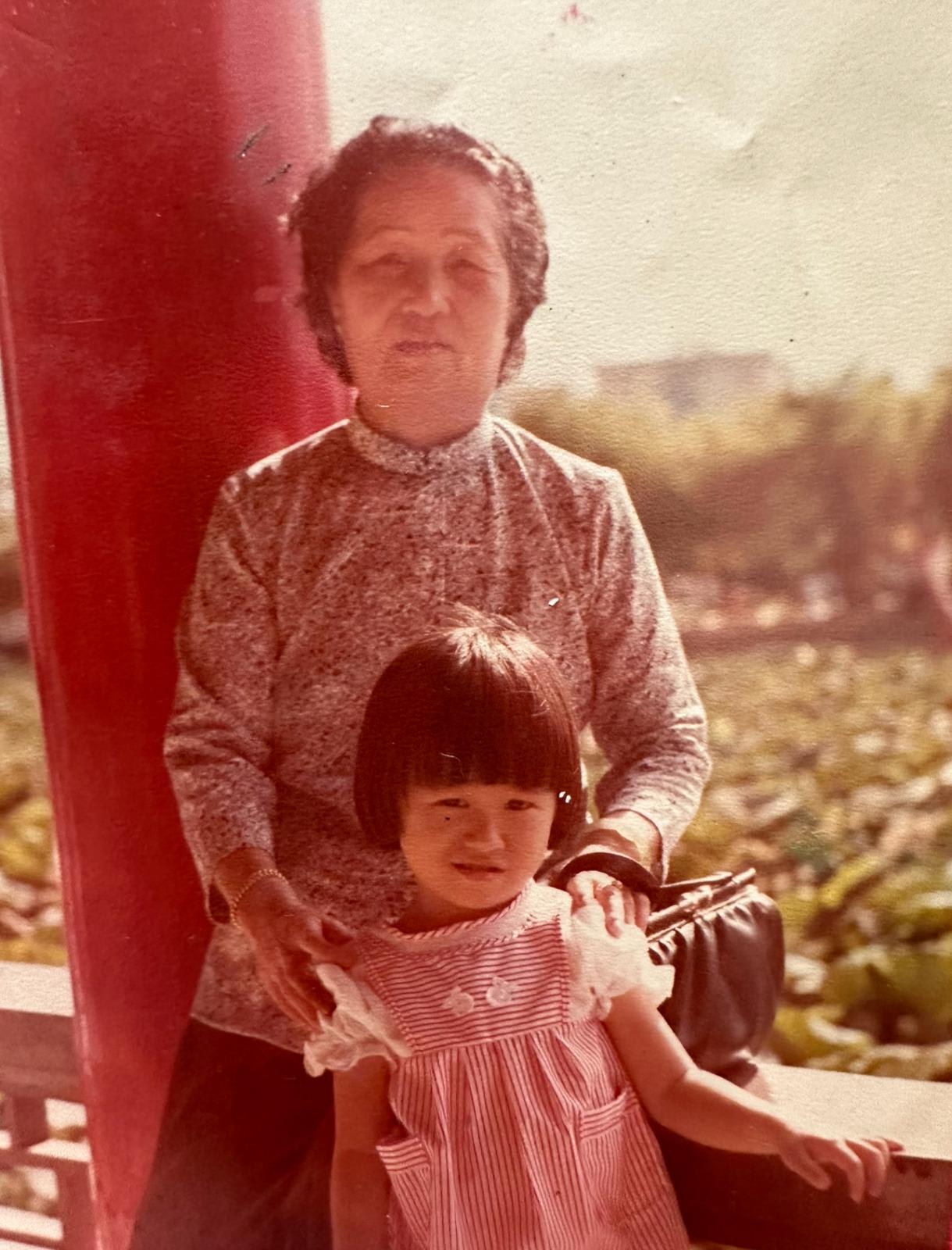
PUTTING THE PLAN IN ACTION
With the location of the village and the name of someone who might possibly still be living there, Amy and her father started to plan their trip to Shantou.
The pair decided to fly to Jieyang, the nearest international airport to Shantou, and drive to the town of Chendian and search for the old village.
Their plan was to locate their family’s ancestral hall, a village shrine that honours generations of family members.
It was their best bet at finding their relatives as such halls typically house ancestral tablets of a clan, as well as their genealogical records also known as “Zupu” (Mandarin for family tree book).
“Before I actually booked the tickets, I had a conversation with my father. I said that this might be a wasted trip because we were going into the dark, with our eyes closed.
”There was no way to guarantee that we would be able to find anybody or whether the village was even still there. So I asked him if he still wanted to give it a shot.
“He agreed … he was confident that as long as we were able to find the village, he was fairly sure that by asking around, there was still a chance of being able to find somebody.
“We just went with no expectations. If we didn’t find anything, then it would just be a holiday for us and if we managed to find (our relatives), then that would be a big bonus. So that was how we framed our mindset before we set off.”
In the afternoon of Jun 21, both father and daughter hopped on the plane, filled with excitement as they made their way to the land of their forebears.
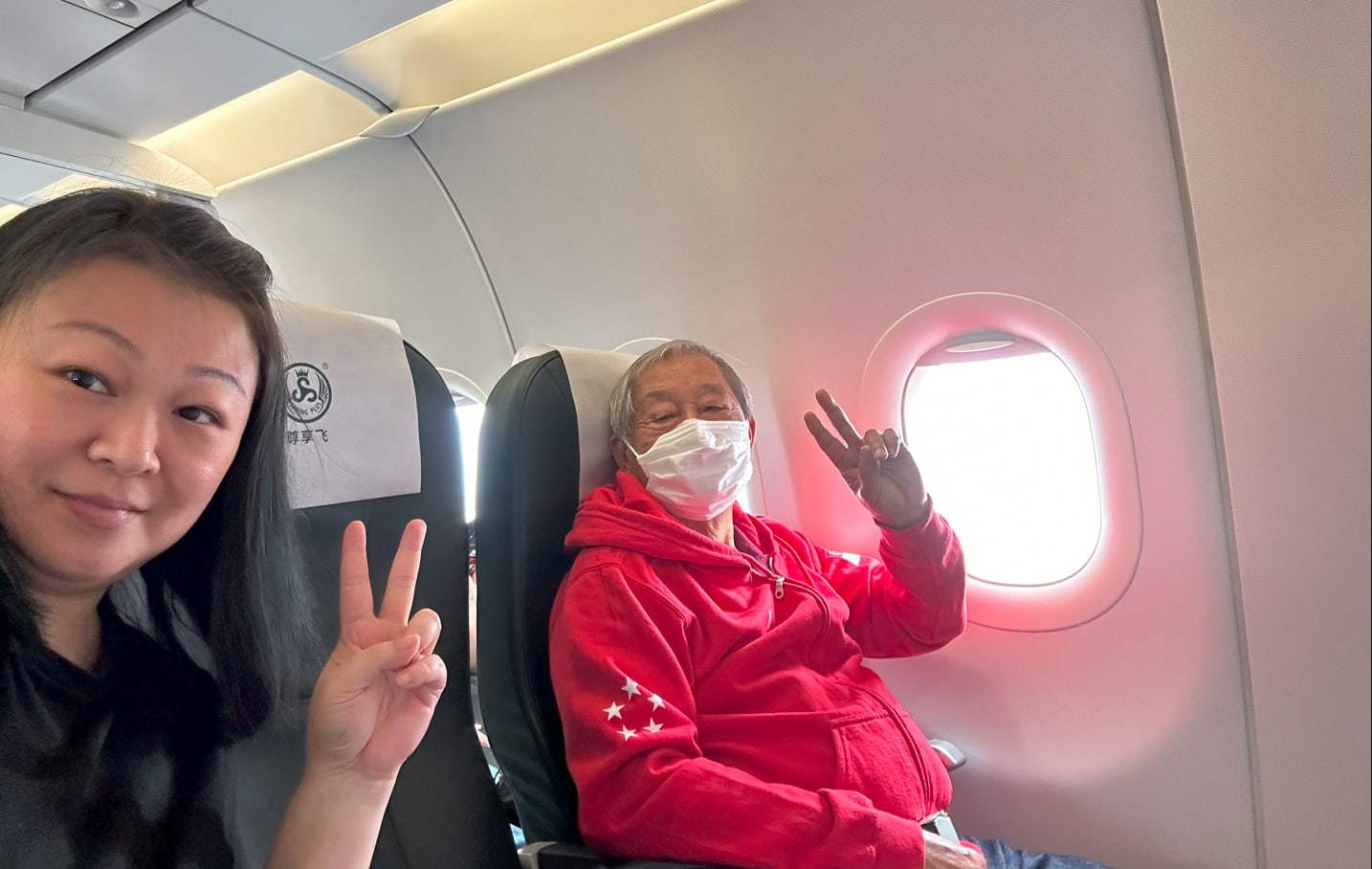
The air was warm as they stepped out of Jieyang Chaoshan International Airport that evening.
The flight had taken nearly five hours and it took them another hour by taxi to reach Shantou, where they spent the night.
The next afternoon, they set out for the town of Chendian, which was another one-and-a-half hours away by cab.
As they drove towards the town, Amy noticed that the area looked relatively modern and urbanised.
She had been hoping to tap on her father’s memories of the place to navigate her way to the old village but the landscape had transformed dramatically since his last visit 20 years ago.
Gone were the old houses and dirt roads that used to occupy the area – in their place, stood high-rise buildings and expressways.
“My father said he could no longer recognise the area or remember where (their relatives’ old house) was because a lot of urbanisation had already happened,” she said.
It was nearly 4pm by the time they reached their hotel and got settled in. Their room overlooked the town and from their window, Amy saw high-rise buildings scattered across the landscape as far as her eyes could see.
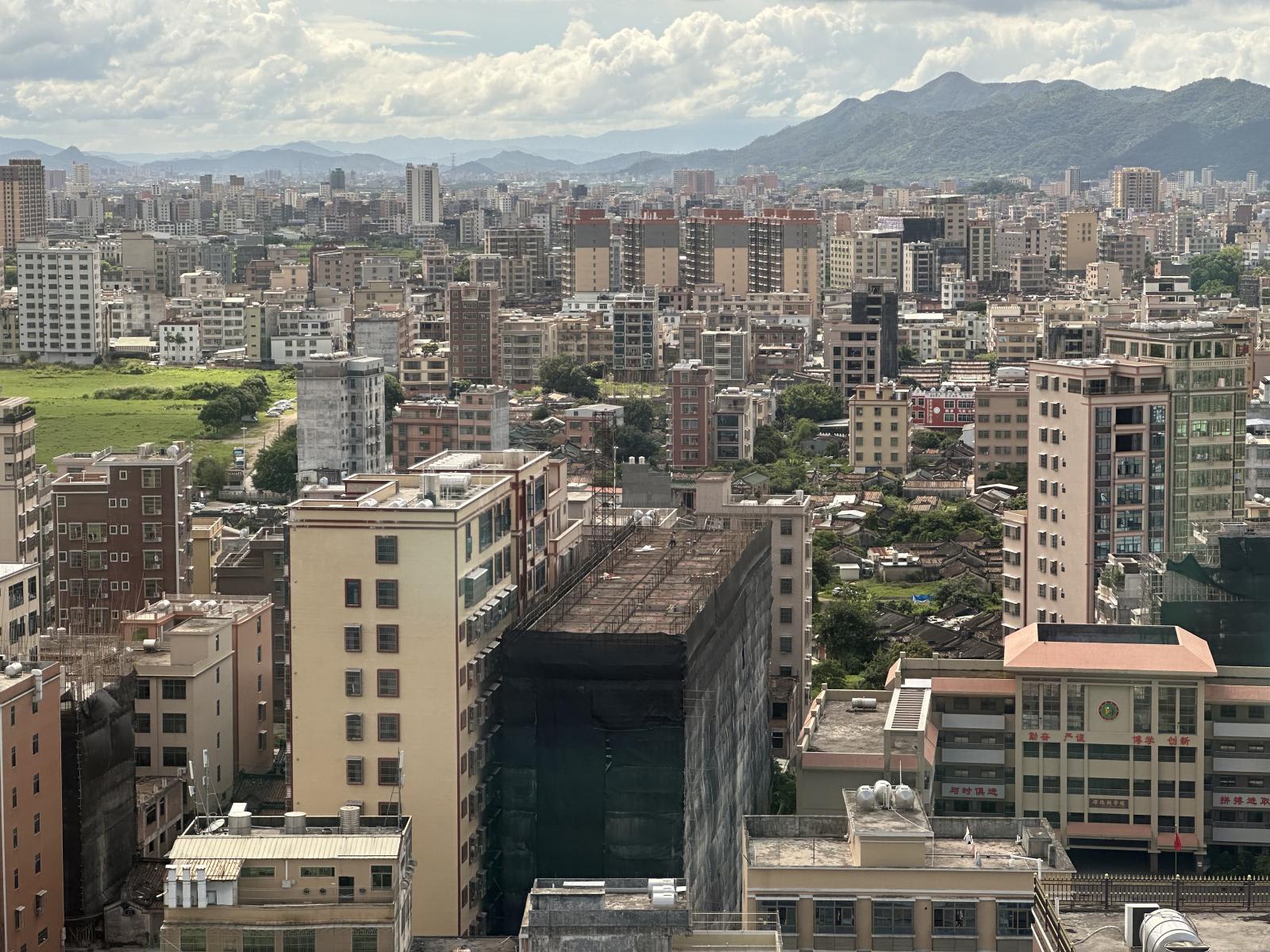
Among the sprawling modernity of the town, spots of green with visibly older, traditional houses caught her eye.
From their distinctive sloped roofs, she guessed that these might have once belonged to villagers or could still be home to their descendants.
“We hadn’t planned to venture out to the village because we didn’t know what to expect after the sky grew dark – was it going to be safe?” she said.
“But when we saw that it was fairly developed and that it was not in the boondocks, a forested area or that we would have to cross marshland, both of us just decided that we would walk to the village and make our first attempt to find the village.”
FINDING THE VILLAGE
The main street of Chendian was bustling with activity as Amy and her father strolled towards the area they had seen from the hotel window.
Restaurants were rushing to prepare for the dinner crowd, while workers in the small factories finished up for the day.
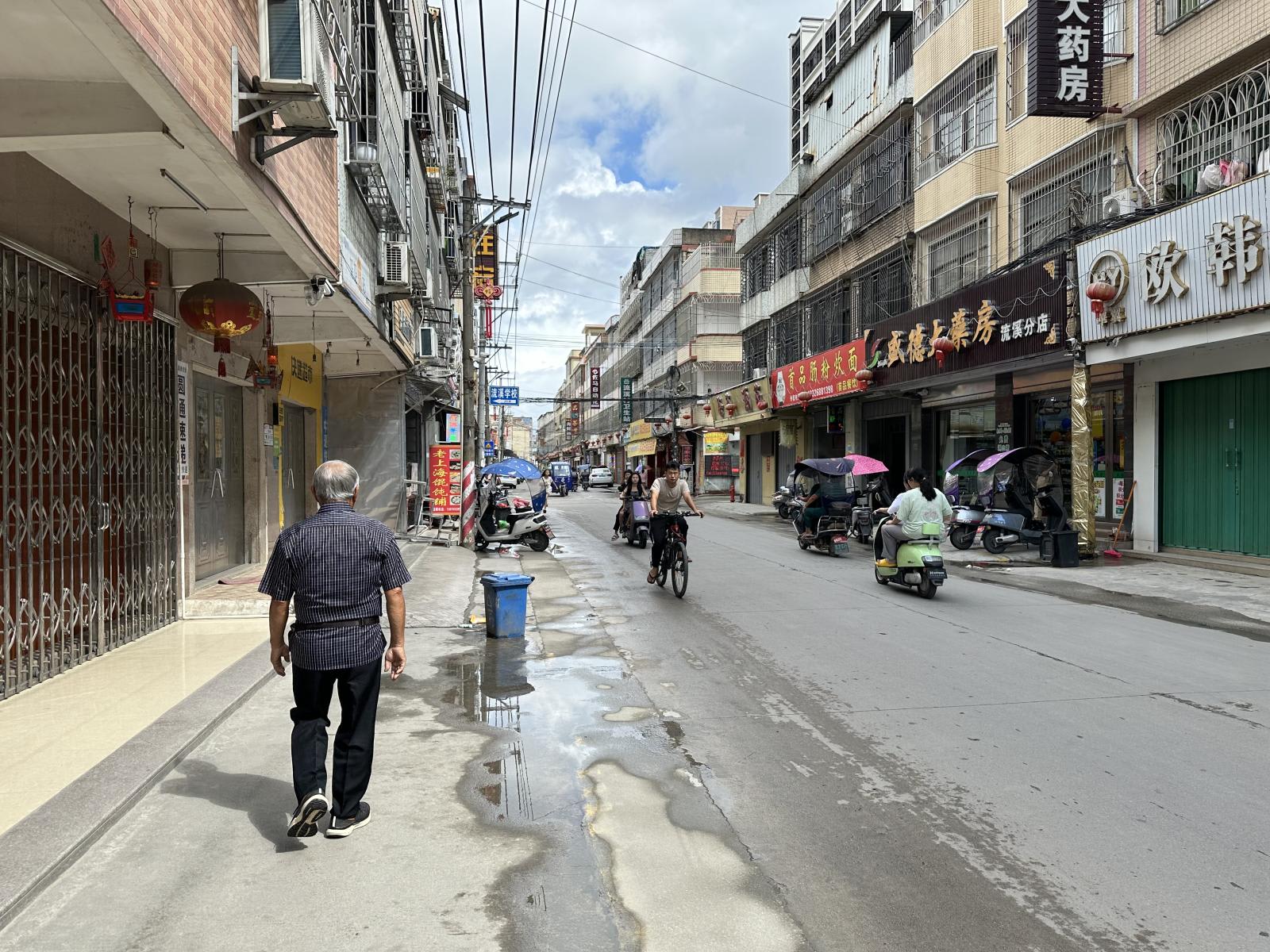
A short walk later, the high-rise buildings were now behind them and lush greenery enveloped them. At the intersection of the street, Amy saw rows of traditional courtyard residences, all in the same grey colours, connected by wide alleys and lanes.
Walking through the alleyways, they stumbled upon a row of temples with red lanterns, stone sculptures and paintings of deities.
Carved in gold above the front doors of one of the temples, read the Chinese characters “The Chia clan’s ancestral hall”.
“We knew it was going to be locked up because it’s not like a museum … It’s usually only used for special occasions or days when they were doing offerings (to ancestors). But it was our only lead to finding our relatives,” said Amy.
With the houses located so close to the ancestral hall, she knew there was a good chance that some of the people who stayed in the area were from the same clan as her and might know her relatives.
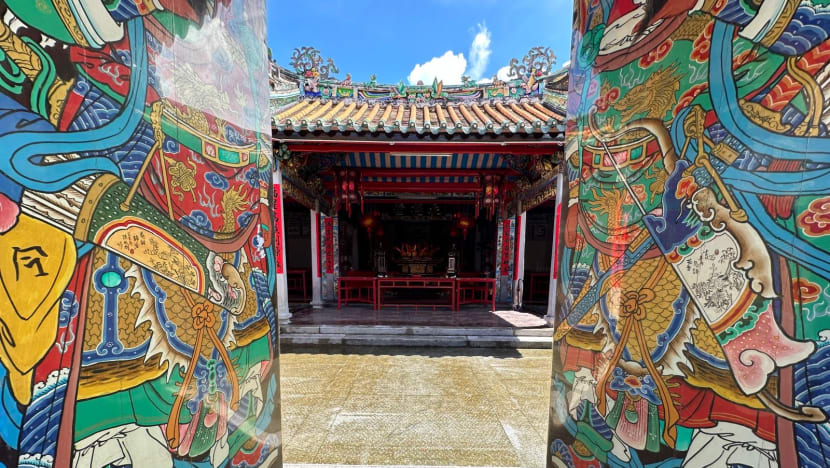
The sounds of people talking and children shrieking with joy interrupted her thoughts. Following the noise, she scanned the area and saw a large crowd congregating at a small playground across the temple.
Remembering the name of the relative who lived in the village, Amy and her father walked over and approached an elderly couple, hoping that they would know who he was.
Their chance encounter turned out to be a fortuitous one. Not only did the elderly man belong to the same clan as Amy and her father, he also knew the man they were looking for.
Through him, Amy learnt that Chia Chun Nan, the son of her youngest granduncle, had died two years ago and that his widow still lived in the village, along with her daughters and daughter-in-law.
As the man was not very mobile, his wife offered to take them to their relatives’ house, leading them through the streets and alleys of the area, going past rows of houses.
“When we walked into an alley, we met a woman who turned out to be Chun Nan’s daughter-in-law,” said Amy.
“She was on her way out on a scooter when the elderly lady, who was leading us, called out to her and said that we were visiting from Singapore and that we were relatives looking for Chun Nan and his wife.
“She looked a bit confused but she turned around and the whole lot of us went to the house.”
Before long, they arrived at the doorstep of a house with metal sliding doors. Its grey façade made it look almost identical to the rest of the houses in the neighbourhood.
If not for the celadon green signboard that hung above the door, it could have been mistaken for any other house.
The large Chinese characters carved into the board read “He De Ju” (Mandarin for the House of He De).
Recalling the moment he saw the signboard, Amy’s father teared up.
“I recognised the character ‘He’. That was my father’s name,” he said.
“I knew that my parents had helped and contributed money to build the house for my Shantou relatives but seeing my father being honoured like this really touched me.”
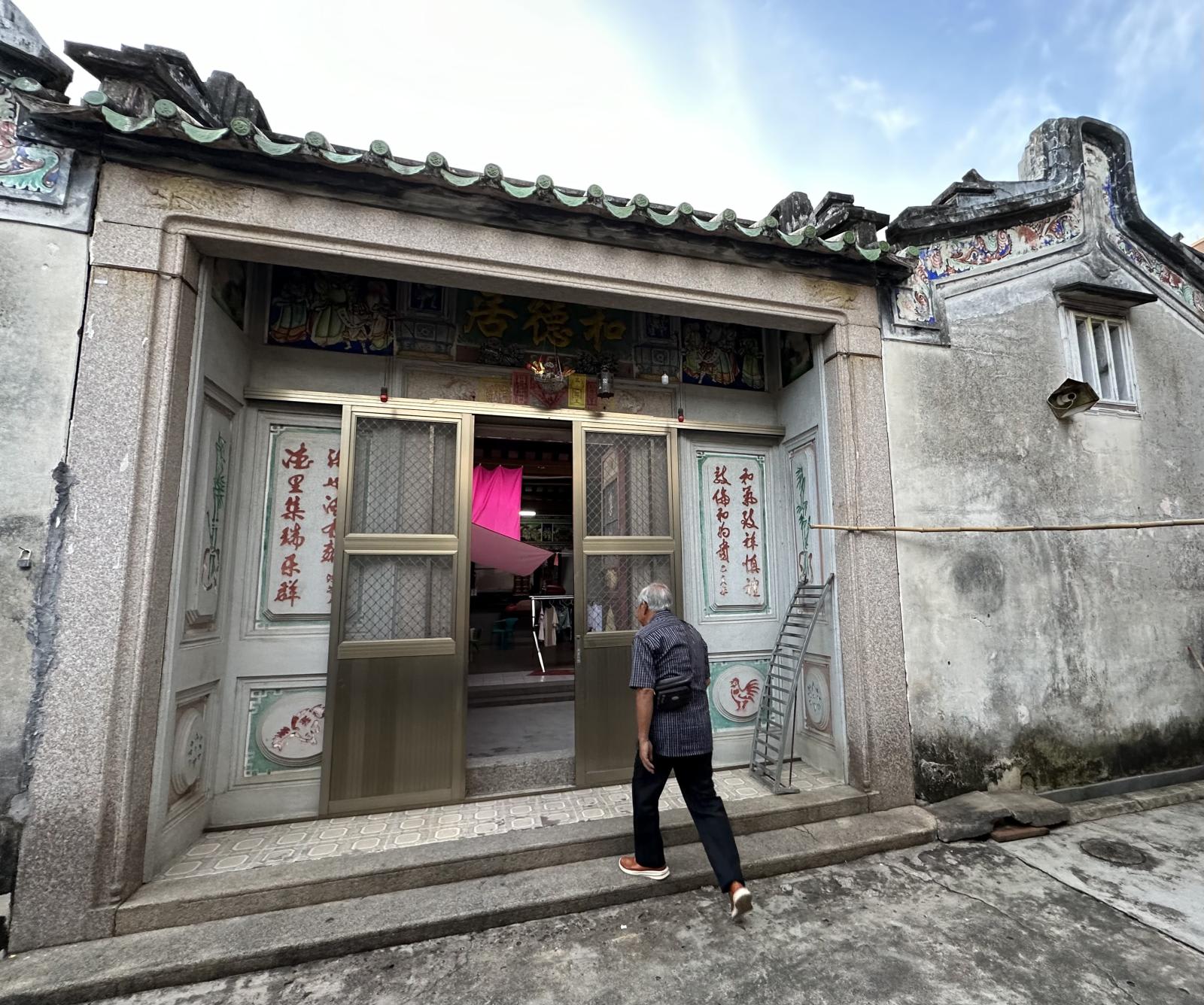
REUNITED, AT LAST
At the entrance of the house, the elderly lady who had led Amy and her father there called out to the wife of Chun Nan.
“She asked my Ah Sim (Teochew for Aunt) to come out of the house, saying that she had visitors from Singapore … When she came out, we greeted her and introduced ourselves.
“It was an unexpected surprise for my aunt and my father was very happy to see her.”
“For me, I just felt a great relief,” she said with a chuckle. “I went there with really, very low expectations so much so that I had been prepared to return with nothing.
“So when my father and my aunt reunited and validated each others’ identities by reminiscing stories of his last visit and everything clicked, I just thought ‘oh my god, we found them’.”
It felt like stepping back in time as they entered the large red front doors of the house.
Built in traditional Teochew-style, single-storey rooms were arranged in a quadrangle formation, with a courtyard in the centre.
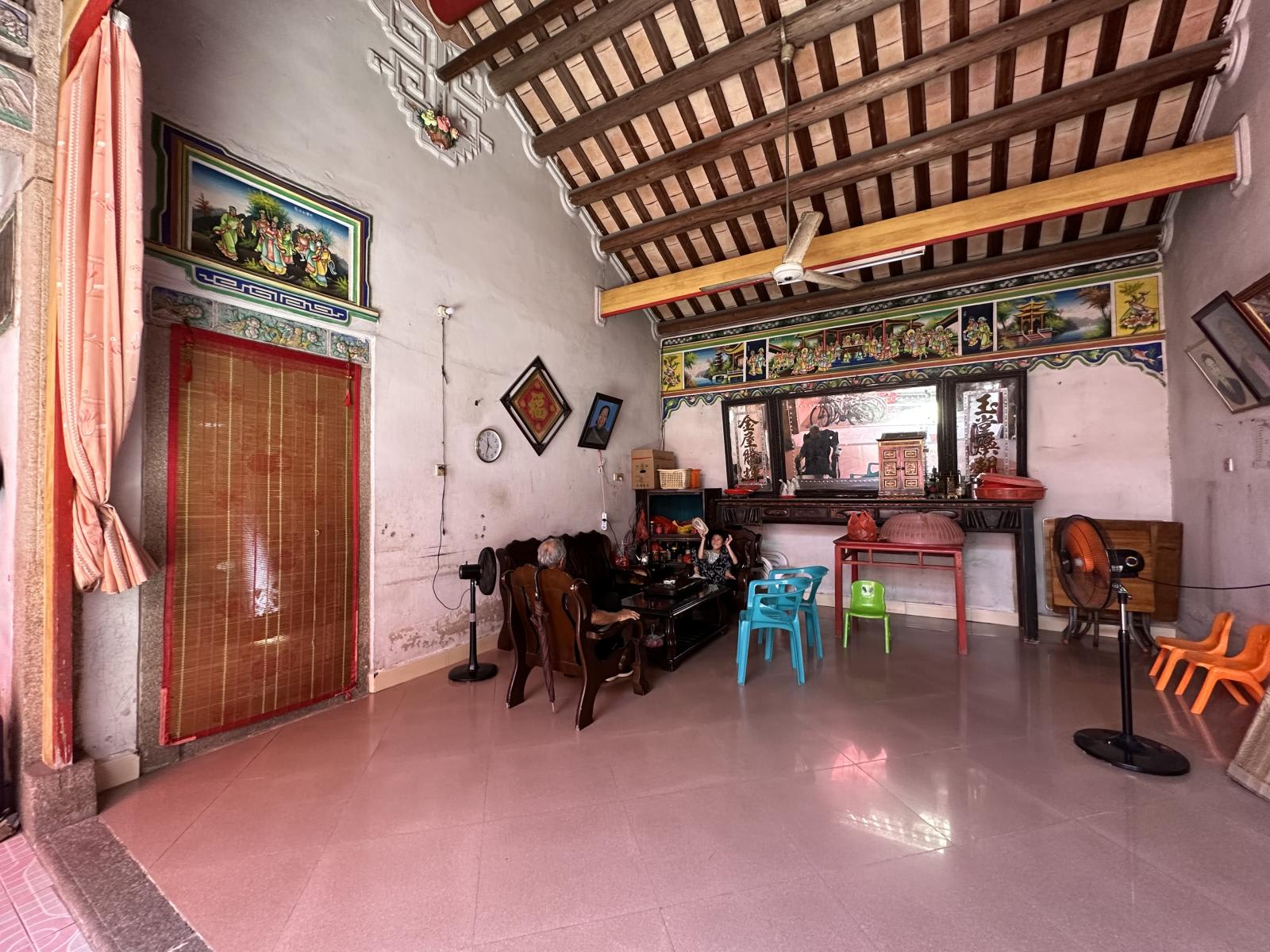
Taking in the sights of the house, Amy could see that it was spartan with an eclectic mix of the old and the new. The bright colours of blue, green and orange plastic chairs contrasted with the dark brown mahogany furniture in the main hall. Electric fans whirred in the background.
The sound of water bubbling could be heard from the kitchen as pots and pans simmered on the electric stove. In the corner, a large lid covered the old coal stove.
If they were shy or feeling awkward, their hosts showed no signs of it. Instead, they warmly ushered Amy and her father into the main hall, offering tea to them as they settled down on the wooden chairs.
Conversations began in a somewhat stilted manner as each side asked basic questions but as they grew more comfortable with each other, it started to flow more naturally.
Gradually, a warm sense of kinship developed between these almost-strangers as they found common ground in their shared stories of their ancestors.
“We just started catching up, trying to find out how Chun Nan lived, where our cousins were right now … We found out that Chun Nan had four children, two sons and two daughters.
“Both sons had gone to work in Shenzhen, while the two daughters married within the same village. One of the daughters sells undergarments and the other runs a food stall with her husband.
“There were a lot of video conference calls with the two male cousins who were away, working in the city, and then my female cousins came so we all just drank tea and talked.”
“It was really quite an amazing experience seeing that I had cousins, nieces and nephews and other family members back where my grandparents had come from.”
As the sky darkened, their hosts insisted that Amy and her father stay for dinner, preparing a simple meal of rice and dishes.
For the first time, these separate branches of the same family sat together to share a meal.
With the promise of seeing each other the next day, Amy and her father went back to the hotel for the night.
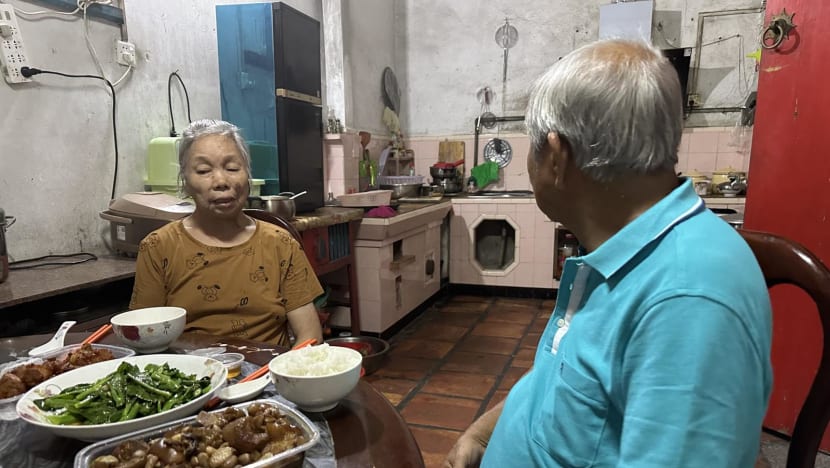
The next morning, they arranged to meet their relatives at their clan’s ancestral hall so that they could pay respects to their ancestors.
They also visited the house that Amy’s grandfather grew up in. But the building, which had once been full of life, had deteriorated over time after it was abandoned.
“The house was now in ruins so we could only look at it from the outside,” said Amy.
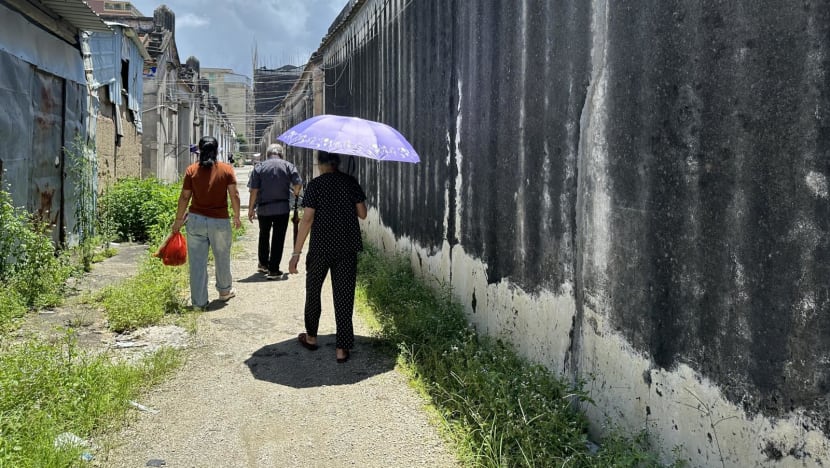
That night, after Amy and her father had returned to the hotel for the night, one of her cousins came to visit them, bearing gifts.
“Earlier that morning, I had mentioned, just in passing, that my grandmother used to bring aged Chai Poh (preserved sweet radish) back to Singapore whenever she came back from China. It was one of my earliest memories of her.
“So I asked where I could buy it because we were planning to go to a market in the town of Chendian,” said Amy.
“My cousin visited us at the hotel and brought us bags of local produce such as Chai Poh, olives and preserved plums. There was so much of it that we weren’t able to bring everything back because we only brought two small suitcases with us.”
Their generosity touched Amy greatly, who had not expected anything from her passing comment.
On their last evening in Chendian, they all had dinner together before Amy and her father flew back to Singapore.
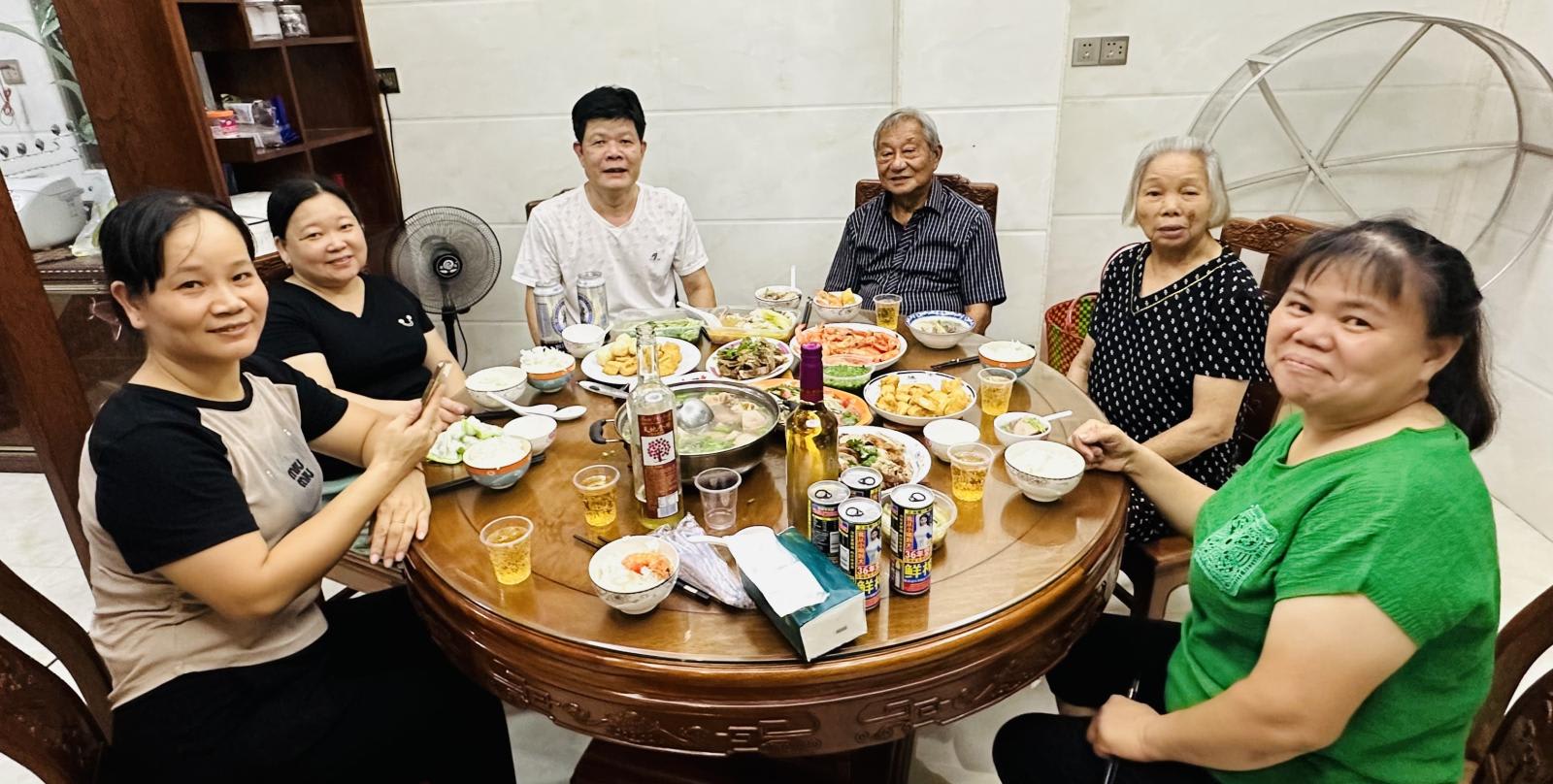
“We told them a simple family dinner would do and not to make a big fuss, just whatever they usually eat. We were just happy to be with the family.”
“My cousin wanted to cook for us in her house so we went to her house and it was only then that we realised that her husband had cooked a big feast for us, with prawns and crabs. There was so much food.
“Everyone, including the kids (of our relatives), came to eat with us so it was like a complete family gathering and the mood was very celebratory and happy.
“We were all talking and just spoke about everything that came to our mind. They asked us to come back again during Chinese New Year because the cousins working in the cities would be home and could bring us around then.
“They also spoke very fondly of my grandmother, who had been quite central to providing aid to the family when she was still alive, as well as my aunts and said they missed them and hoped to see my aunts again.
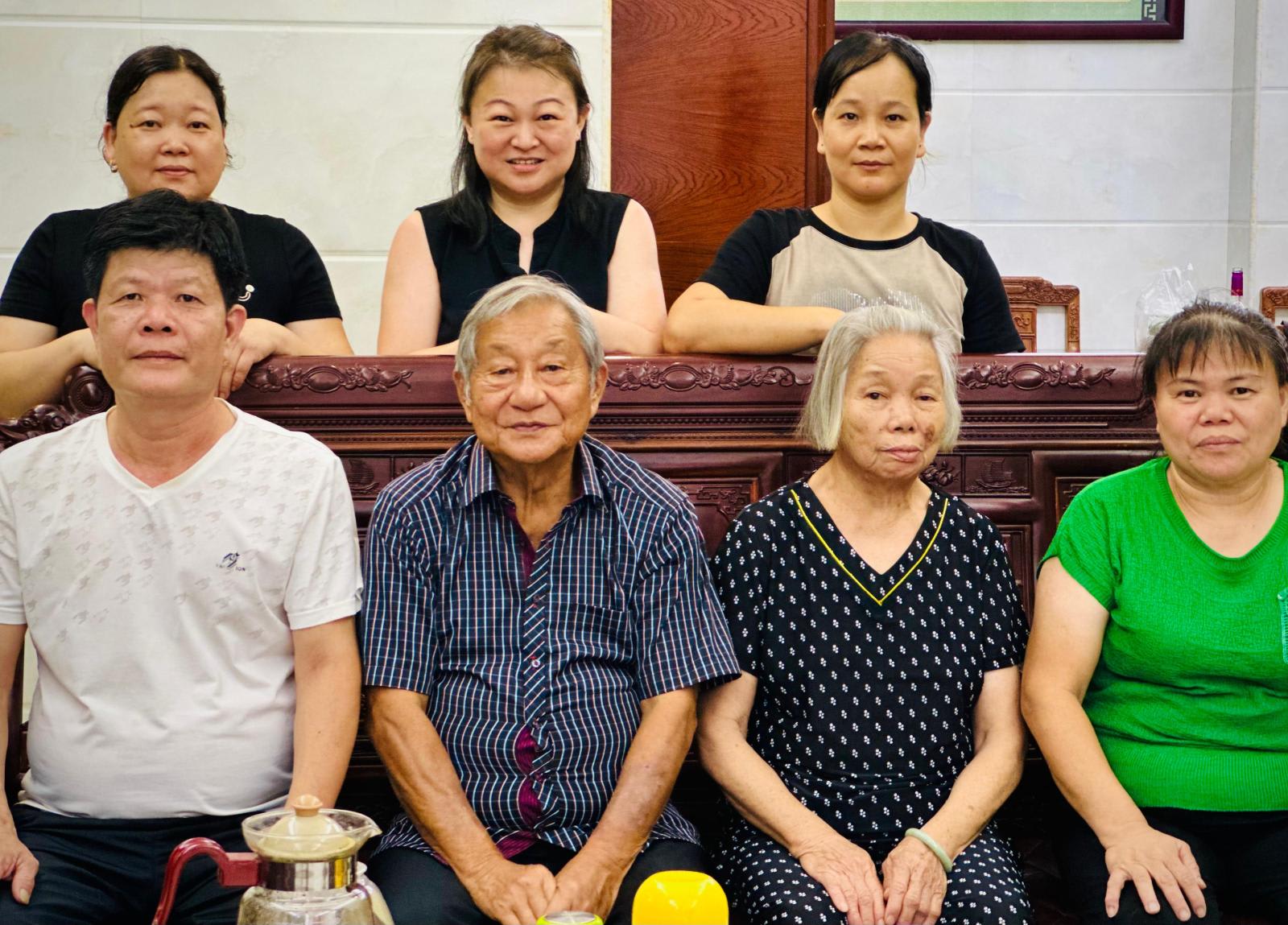
Although her trip had been short, Amy felt like she had gained so much from it.
“I started out with no expectations and very little knowledge about who my relatives in China were, so I really went in with an open heart and meeting them has given me a hope that there’s more to find out and more family members to get to know,” she said.
“I don’t think we look alike but I did see some similarities with my relatives in China and Singapore in that we all talk very loudly, like we want to fight. The women in our family also tend to grow fat and round,” added Amy with a laugh.
“I definitely feel a sense of kinship with them … When we met them, it was different from meeting a stranger or even long-lost friends, there was no barrier. It just came naturally and we embraced each other with no reservations.”
As for her father, he said he felt a sense of peace having reunited with his relatives once more.
“When I was young, my parents would often talk about the home they had left behind in China and how poor their family had been.
“But going back this time, I could see such improvements in their lives and that made me feel so happy and brought a lot of comfort to me too,” he said.
A GENERATION REUNITED
In finding our long-lost relatives, Amy and her father helped to bring closure to members on both sides of the family who had been longing to reconnect but never had the means to do so.
It gave my family a sense of completeness and relief, just knowing that this branch of family existed and that we were now in touch.
I wondered if it was the same for my relatives in China, so I decided to call them. Amy had set up a group on WeChat so that relatives from Shantou and Singapore had a way to keep in touch.
Unable to speak Teochew, my mother became my translator, helping me to ask the questions I did not have the language to speak.
As I listened to my mother and her cousin conversing in Teochew, what struck me was how there seemed to be some sort of kinship between the two, despite having never met.
“Can I call you big sister? You’re older than me right?” asked my mother’s cousin Chia Xi Qin in Teochew.
To which, my mother replied “Yes! I think I’m a few years older than you.”
During the call, Xi Qin, who had been in Shenzhen working when Amy visited, told us that his mother (Amy’s aunt) had initially been wary when the pair showed up at the door.
“For years, we did not have any contact with our relatives in Singapore and then suddenly someone showed up, so my mother was a little suspicious but once she realised who they were, she welcomed them,” said Xi Qin.
“We always knew we had relatives in Singapore and in fact, Amy’s grandmother and some of her daughters had visited us before so when Amy sent us pictures of her aunties in the WeChat group, I immediately recognised them.”
“In the past, when Amy’s grandmother visited us, she would always stay for at least a month so I have a deep impression of her. She would always bring clothes for the family and I would always rush to claim the ones I liked the most,” he added with a chuckle.
“The last time Amy’s grandmother visited, I could see she wasn’t doing well physically but she said she would return the following year but she never did.
“There was no word from the other side or any contact all these years, until Amy and her father showed up at our door.”
“This visit meant a lot to us. The Singapore and Chinese cousins in my generation have never met each other, we don’t even know what each other looks like, but we are finally in touch and for that, I’m very, very happy.”
It has been three weeks since our last call and the dust has settled. Once abuzz with a flurry of messages, videos and old photos, the family chat group is now mostly quiet.
But unlike the silence that both sides endured for so many years, this one is comfortable. After decades of having no contact with each other, my family is just a message or call away from our Chinese relatives.

























